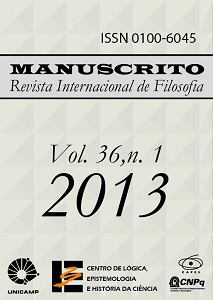Resumen
Quais termos são suscetíveis de operações silogísticas? Para importantes intérpretes da lógica aristotélica – especialmente Ross, Patzig e Lukasiewicz – a resposta tende a introduzir um único e homogêneo grupo de termos, aqueles de generalidade intermediária (τὰ μεταξὺ). Fundamentada basicamente na classificação tripartite de entes que aparece no capítulo 27 de Primeiros Analíticos I, essa opinião atribui à silogística a exclusão de (i) termos singulares (como “Sócrates” e “este homem”), (ii) transcategoriais (como “ente” e “um”), bem como dos chamados (iii) summa genera (“substância”, “qualidade”, “quantidade”, etc.). Em nossa opinião, esses resultados não derivam dos textos de Aristóteles, mas de leituras, traduções e interpretações impróprias das passagens centrais da discussão. Neste artigo, faremos um novo exame desses textos, a fim de mostrar que Aristóteles jamais afastou de sua lógica os tipos de termos que os intérpretes não hesitam em excluir da silogística. Assim, esperamos reintroduzir termos singulares, transcategoriais e summa genera, no domínio da silogística aristotélica.
Abstract:
What terms are susceptible of syllogistic operations? For important interpreters of Aristotelian logic – especially Ross, Lukasiewicz and Patzig – the answer tends to introduce a single and homogeneous group of terms, those of intermediate generality (τὰ μεταξὺ). Mostly based on the tripartite classification of beings which appears in Chapter 27 of Prior Analytics I, this view attributes to syllogistic the exclusion of proper names and singular designations (such as “Socrates” and “this man”), transcategoricals (such as “being” and “one”), as well as of the so-called summa genera (“substance”, “quality”, “quantity”, etc.). In our opinion, these results are not derived from the writings of Aristotle, but from improper readings, translations and interpretations of the central passages for the discussion. In this paper, we will make a further examination of these texts in order to show that Aristotle has never departed from his logic the types of terms that interpreters do not hesitate to exclude from syllogistic. Thereby, we hope to bring back singular terms, transcategoricals and summa genera to the operation domain of the Aristotelian syllogistic.
Keywords: Aristotle. Syllogistic. Singular Terms. Transcategoricals. Summa Genera.
Citas
ANGIONI, L. “O Conhecimento Científico no Livro I dos Segundos Analíticos de Aristóteles”. Revista de Filosofia Antiga (online), vol. 1, n. 1, 2007 (http://www.filosofiaantiga.com/documents/23.html).
BARNES, J. (ed.). Aristotle: Prior Analytics (trans. by A. J. Jenkinson in Barnes, 1984, vol. 1, p. 39−113).
BARNES, J. Truth, etc., Six Lectures on Ancient Logic. Oxford: Clarendon Press, 2007.
BOCHENSKI, J. Ancient Formal Logic. Amsterdam: North-Holland Publishing, 1951.
CORCORAN, J. “Completeness of an Ancient Logic”. Journal of Symbolic Logic, 37, 696−702, 1972.
KEYNES, J. N. Studies and Exercises in Formal Logic (fourth edition rewritten and enlarged). New York: The Macmillan Company, 1906.
LUKASIEWICZ, J. Aristotle’s Syllogistic from the Standpoint of Modern Formal Logic. Oxford: Clarendon Press, 1951.
MALINK, M. “A Non-Extensional Notion of Conversion in the Organon”. Oxford Studies in Ancient Philosophy, Vol.
XXXVII, p. 106−141. Oxford University Press, 2009.
MIGNUCCI, M. Aristotele: Gli analitici primi – Traduzione, introduzione e commento. Naples: Loffredo, 1969.
MIGNUCCI, M. Aristotle’s Theory of Predication, in I. Angelilli and M. Cerezo (eds.), Studies in the History of Logic, 1−20. Berlin, 1996.
MIGNUCCI, M. Parts, Quantification and Aristotelian Predication, Monist, 83, 3−21, 2000.
PATZIG, G. Aristotle’s Theory of the Syllogism: A Logico-Philosophical Study of Book A of the Prior Analytics. Translated by Jonathan Barnes. Dordrecht: Reidel, 1959.
ROSS, W. D. Aristotle’s Prior and Posterior Analytics. Oxford: Clarendon Press, 1949.
ROSS, W. D. Aristotle’s Metaphysics. Oxford: Clarendon Press, 1953 (1924).
SHOREY, P. “A Note on Aristotle’s Metaphysics 1086b 32−37”. Classical Philology, Vol. 8, n. 1, pp. 90−92, 1913.
SMITH, R. Aristotle: Prior Analytics. Indianapolis: Hackett Publishing Company, 1989.
STRIKER, G. Aristotle: Prior Analytics Book I. Oxford: Clarendon Press, 2009.

